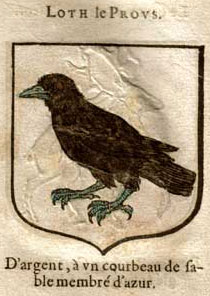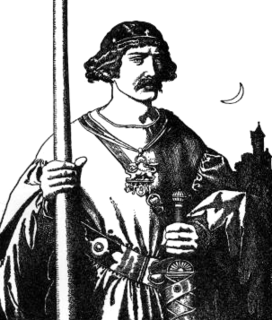
Rheged was one of the kingdoms of the Hen Ogledd, the Brittonic-speaking region of what is now Northern England and southern Scotland, during the post-Roman era and Early Middle Ages. It is recorded in several poetic and bardic sources, although its borders are not described in any of them. A recent archaeological discovery suggests that its stronghold was located in what is now Galloway in Scotland rather than, as was previously speculated, being in Cumbria. Rheged possibly extended into Lancashire and other parts of northern England. In some sources, Rheged is intimately associated with the king Urien Rheged and his family. Its inhabitants spoke Cumbric, a Brittonic dialect closely related to Old Welsh.
Modron ("mother") is a figure in Welsh tradition, known as the mother of the hero Mabon ap Modron. Both characters may have derived from earlier divine figures, in her case the Gaulish goddess Matrona. She may have been a prototype for Morgan le Fay from the Arthurian legend.

Ida is the first known king of the Anglian kingdom of Bernicia, which he ruled from around 547 until his death in 559. Little is known of his life or reign, but he was regarded as the founder of a line from which later Anglo-Saxon kings in this part of northern England and southern Scotland claimed descent. His descendants overcame Brittonic resistance and ultimately founded the powerful kingdom of Northumbria.
Owain mab Urien was the son of Urien, king of Rheged c. 590, and fought with his father against the Angles of Bernicia. The historical figure of Owain became incorporated into the Arthurian cycle of legends where he is also known as Ywain, Yvain, Ewain or Uwain. In his legendary guise he is the main character in Chrétien de Troyes's Yvain, the Knight of the Lion and the Welsh Romance Owain, or the Lady of the Fountain, which corresponds to Chrétien's poem.

King Lot, also spelled Loth, is a British monarch in Arthurian legend. He was introduced in Geoffrey of Monmouth's influential chronicle Historia Regum Britanniae that portrayed him as King Arthur's brother-in-law and under-king, who serves as regent of Britain during the time between the reigns of Uther and Arthur. In the wake of Geoffrey, Lot has appeared regularly in the works of chivalric romance, alternating between the roles of Arthur's enemy and ally. He chiefly figures as ruler of the northern realm of Lothian and sometimes Norway; in other texts he rules Great Britain's northernmost Orkney isles. He is generally depicted as the husband of Arthur's sister or half-sister, often known as Anna or Morgause. The names and number of their children vary depending on the source, but the later romance tradition has given him the sons Gawain, Agravain, Gaheris, Gareth, and Mordred. Lot's literary character is likely connected to the hagiographical material concerning Saint Kentigern, which feature Leudonus as king of Leudonia and father of Saint Teneu.

Urien, often referred to as Urien Rheged or Uriens, was a late 6th-century king of Rheged, an early British kingdom of the Hen Ogledd. His power and his victories, including the battles of Gwen Ystrad and Alt Clut Ford, are celebrated in the praise poems to him by Taliesin, preserved in the Book of Taliesin. He became the "King Urien of Gorre" of later Arthurian legend and his son Owain mab Urien was later known as Ywain.

Sir Ywain, also known as Yvain, Owain, Uwain(e), Ewaine, Iwain, Iwein, Ivain, Ivan, etc., is a Knight of the Round Table in Arthurian legend, wherein he is often the son of King Urien of Gorre and the sorceress Morgan le Fay. The historical Owain mab Urien, on whom the literary character is based, was the king of Rheged in Great Britain during the late 6th century.
Morfydd ferch Urien is a figure of Welsh Arthurian legend. She is the daughter of Urien Rheged by Modron, and twin sister to Owain. Morfydd appears in the Welsh Triads and is also referred to in Culhwch and Olwen. The enduring love between her and Cynon son of Clydno, one of Arthur's warriors, is remarked on in several of the Triads, pointing to a now lost popular tradition.
Morcant Bulc was a Brythonic prince, probably a king, from Northern Britain, during the period between the end of the Roman Empire and the establishment of an English state during the early Middle Ages.
Llywarch Hen, was a prince and poet of the Brythonic kingdom of Rheged, a ruling family in the Hen Ogledd or "Old North" of Britain. Along with Taliesin, Aneirin, and Myrddin, he is held to be one of the four great bards of early Welsh poetry. Whether he actually wrote the poems attributed to him is unknown, and most of what is known about his life is derived from early medieval poems which may or may not be historically accurate.
Cynfarch Oer was probably a 6th-century king of the Sub-Roman realm of Rheged, believed to be located in north-west England and south-west Scotland.
Dynod son of Pabo, better known as Dynod the Stout or Dynod Fawr was the ruler of a small kingdom in the North Pennines in the post-Roman Hen Ogledd. Regio Dunutinga was a minor kingdom or region in North Yorkshire mentioned in the Life of Wilfrid. P.N. Wood identifies this with the area of Craven.
Gwallog ap Lleenog was a hero of the Hen Ogledd. He has long been considered a probable sixth-century king of the sub-Roman state of Elmet in the Leeds area of modern Yorkshire, though some more recent scholarship would identify him more tentatively simply as a 'king of an unidentified region in the north'.
Clydno Eidyn was a ruler of Eidyn, the district around modern Edinburgh, in the 6th century. Eidyn was a district of the Gododdin kingdom in the Hen Ogledd, or "Old North", the Brittonic-speaking parts of Northern England and southern Scotland in the Early Middle Ages. Clydno became a figure in Welsh tradition.

Aeron was a kingdom of the Brythonic-speaking Hen Ogledd, presumed to have been located in the region of the River Ayr in what is now southwestern Scotland. It existed during the post-Roman era, perhaps earlier, and disappeared before or during the 7th-century conquest of the region by the ascendant Kingdom of Northumbria.
The Battle of Argoed Llwyfain was fought between the forces of the Kingdom of Rheged under the command of Urien and Owain mab Urien and the forces of the Kingdom of Bernicia under Fflamddwyn . Most of what is known about the battle comes from the early Welsh poem Gwaith Argoed Llwyfain by the poet and bard Taliesin. Supposedly on one Saturday, Fflamddwyn had surrounded the seat of power within Rheged and demanded that King Urien submit and provide hostages. Urien's son Owain used the memory of his ancestor Ceneu son of Coel and denied giving hostages. Urien then stirred his men and fighting began. In the ensuing combat Fflamddwyn was slain, temporarily freeing Rheged of the Anglian menace.
Canu Llywarch Hen are a collection of early Welsh englyn-poems. They comprise the most famous of the early Welsh cycles of englynion about heroes of post-Roman North Britain.

This is a list of saints associated with the kingdoms of the Hen Ogledd, including Elmet, Rheged, Gododin, Manaw, Lleuddiniawn and Ystrad Clud.
Rhiainfellt, name variants including Rieinmelt and Rieinmelth, was a British princess of the royal house of the kingdom of Rheged, a part of the Hen Ogledd. Her name means "Lightning Maiden" or "Lightning Queen" in Old Welsh. She was a wife of Oswiu, King of Northumbria.

The House of Rheged or the House of Rhun was an informal royal dynasty who ruled in the brittonic Kingdom of Rheged. The line is traced back to Coel Hen whose descendants are often referred to as the Coeling. The dynasty includes Urien, King of Rheged and his son Sir Ywain a Knight of the Round Table in Arthurian legend.




